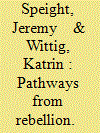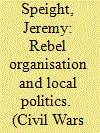| Srl | Item |
| 1 |
ID:
157860


|
|
|
|
|
| Summary/Abstract |
Across diverse liberal war-to-peace transitions, the integration of former armed movements into the post-accord political system has been identified as a significant factor in determining the success of peace processes. There is now a growing literature focusing on rebel-to-party transformations in the aftermath of armed conflict. Despite on-going debates over the long-term implications of rebel-to-party conversions for existing party systems, actual studies focusing on diverse patterns of rebel-party configurations in post-accord transitions remain rare. This article takes a first step to fill this gap by comparing pathways in rebel-party relations in Côte d’Ivoire and Burundi. While the FN in Côte d’Ivoire joined the RDR, an established political party, with FN members running as candidates for the RDR in post-accord elections, the CNDD-FDD in Burundi formed its own party becoming the country’s current ruling party. We develop a theoretical framework analyzing these divergent pathways by exploring how ties between armed movements and pre-conflict political parties shape trajectories of rebel groups during and beyond civil war.
|
|
|
|
|
|
|
|
|
|
|
|
|
|
|
|
| 2 |
ID:
122767


|
|
|
|
|
| Publication |
2013.
|
| Summary/Abstract |
Scholars have begun to show how variations in the organization of rebellion in war can impact outcomes related to the violence used against civilians, military effectiveness of armed groups and the post-conflict transitions. This article suggests that existing approaches in this literature overlook sub-group variations in relationships between national-level leaders of armed movements and local commanders. Exogenous factors that explain organizational variation and organizational effects are generally argued to be group wide. By focusing on the local level, I argue that many of the presumed downstream effects of variation in rebel organization can also contribute to the organizational choices leaders make for controlling local actors. This article demonstrates this argument through the case of Bouna in north-eastern Côte d'Ivoire, where a tax revolt against the local Forces Nouvelles (FN) administration, led by local Lobi youth, forced a restructuring in the relationship between Soro and the local FN commander, Morou Ouattara.
|
|
|
|
|
|
|
|
|
|
|
|
|
|
|
|